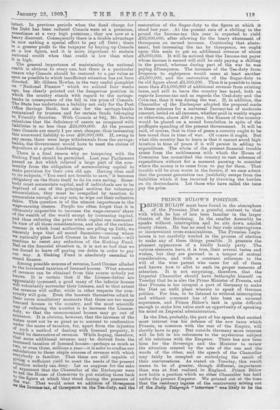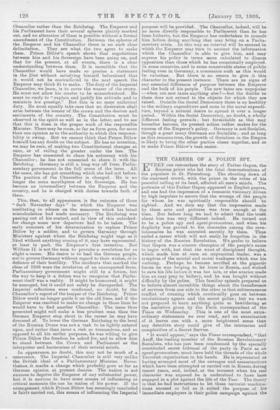PRINCE BULOW'S POSITIQN.
PRINCE BULOW must have found in the atmosphere of the Prussian Diet a grateful contrast to that with which he has of late been familiar in the larger theatre of the Reichstag. In the smaller Assembly he speaks without interruption and he sits down amidst hearty cheers. Ho has no need to fear rude interruptions or inconvenient cross-examinations. The Prussian Legis- lature is too carefully weeded in the process of election to make any of these things possible. It presents the pleasant appearance of a kindly family party. The various elements have, it is true, their several tastes and wishes, but they are pursued in a temper of mutual consideration, and with a constant reference to the will of the wise parent who cares for all of them and knows how to allot to each its proper measure of attention. It is not surprising, therefore, that the Imperial Chancellor should have bethought himself on. Tuesday that lie is also the Prime Minister of Prussia, and that Prussia is too integral a part of Germany to make the Diet an unfit place wherein to speak of German politics. For him, to be listened to without interruption and without comment has of late been an unusual experience, and Prince Billow's task is quite difficult enough to make him value such an opportunity of speaking his mind on Imperial administration.
In the Diet, probably, the part of his speech that excited. most interest was his defence of the new taxes which Prussia, in common with the rest of the Empire, will shortly have to pay. But outside Germany more interest will be felt in his references to the mysterious subject of his relations with the Emperor. There has now been time for the Sovereign and the Minister to review the situation created by the acts of the one and the words of the other, and the speech of the Chancellor may fairly be accepted as embodying the result of their conversations. As stated on Tuesday, this result seems to be of greater, though different, importance than was at first realised in England. Prince Billow now holds a position which no other Chancellor has held under the present Emperor. We pointed out at the time that the residuary legatee of the controversy exiling out pf the Daily Telegraph " interview" was likely to be the Chancellor rather than the Reichstag. The Emperor and his Parliament have their several spheres plainly marked Olt, and no alteration of them is possible without a formal amendment of the Constitution. Between the spheres of the Emperor and his Chancellor there is no such clear delimitation. They are what the two agree to make them. Prince Billow's speech shows that negotiations between him and his Sovereign have been going on, and that for the present, at all events, there is a clear understanding between them. It is incredible that the Chancellor would have made so precise a statement in the Diet without satisfying himself beforehand that it would not be contradicted in the next speech the Emperor may think fit to make. The duty of the Imperial Chancellor, we learn, is to cover the wearer of the crown. He must not allow his master to be misunderstood. He must be ready to "explain and justify his attitude and to maintain his prestige." But this is no mere unilateral duty. He must equally take care that no dissension shall arise between the wearer of the crown and the desires and sentiments of the country. The Constitution must be observed in the spirit as well as in the letter, and to see that this is done is the proper work of the responsible Minister. There may be room, so far as form goes, for more than one opinion as to the authority to which this responsi- bility is owing. But we cannot think that Prince Billow himself has any doubt on the subject. He has no intention, we may be sure, of making two Constitutional changes at once, or of veiling the greater under the less. The Emperor has consented to share his autocracy with his Chancellor; he has not consented to share it with the Reichstag. Germany is still a long way off from Parlia- mentary government in the full sense of the term. All the same, she has got something which she had not before. The position of the Chancellor is changed. He is no longer the mere mouthpiece of his Sovereign. He has become an intermediary between the Emperor and the country, and he is charged with duties towards both of them.
This, then, to all appearance, is the outcome of those " dark November days " in which the Emperor was meditating in silence on the measures which his latest miscalculation had made necessary. The Reichstag was passing out of his control, and in view of this unlooked- for change some new departure had to be taken. The early rumours of his determination to replace Prince Billow by a soldier, and to govern Germany through Ministers against whom the Reichstag might rage as it ,liked without anything coming of it, may have represented, at least in part, the Emperor's first intention. But William II. is not the man to provoke a revolution for so slight a cause. His desire is to lead the German people, not to govern Germany without regard to their wishes, or in defiance of their hostility. The incidents that marked the close of 1908 were the revelation of an unsuspected force. Parliamentary government might still be a fiction, but the way to keep it a fiction was to recognise that Parlia- ment itself was a reality. It might be humoured, it might be managed, but it could not safely be disregarded. The Imperial reflections were confirmed, no doubt, by the Chancellor's report of the temper of the Reichstag. Prince Billow could. no longer guide it on the old lines, and if the Emperor was resolved to make no change in those lines he would have to find another Chancellor. The issue thus presented might well make a less prudent man than the German Emperor stop short in the career lie may have dreamed of. To lower the German Reichstag to the level of the Russian Du= was not a task to be lightly entered upon, and rather than incur a risk so tremendous, and so opposed to all his earlier purposes, he was willing to give Prince Billow the freedom he asked for, and to allow him to stand between the Crown and Parliament as the interpreter and harmoniser of their several minds.
In appearance, no doubt, this may not be much of a • concession. The Imperial Chancellor is still very unlike the British ideal of a Parliamentary Minister. Never- theless, it marks a change which probably goes as far as German opinion at present desires. The nation is not anxious to deprive the Emperor of any substantial power, but it is anxious to have some means of influencing at critical moments the use he makes of his power. If the arrangement which Prince Billow has seemingly concluded is fairly carried out, this means of influencing the Imperial purpose will be provided. The Chancellor, indeed, will be no more directly responsible to Parliament than he has been hitherto, but the Emperor has undertaken to consult him before doing anything that may bring on a Parlia- mentary crisis. In this way an interval will be secured in which the Emperor may turn to account the information which the Chancellor is able to give him, and may express his policy in terms more calculated to disarm opposition than those which he has occasionally employed. In some countries, and in some conceivable states of public, feeling even in Germany, a concession such as this would be valueless. But there is no reason to give it this character in the present instance. There are no signs of any essential difference of purpose between the Emperor and the bulk of his people. The new taxes are unpopular —when are new taxes anything else P—but the dislike to them does not extend to the objects for which they are raised. Outside the Social Democracy there is no hostility to the military expenditure and none to the naval expendi- ture, beyond a natural desire to spread it over a longer period. Within the Social Democracy, no doubt, a wholly different feeling prevails ; but formidable as this may hereafter become, its present action rather makes for the success of the Emperor's policy. Germany is not Socialist, though a great many Germans are Socialists ; and as long as this remains true, the growth of Socialism in the Empire is likely to bring the other parties closer together, and so to make Prince Billow's task easier.







































 Previous page
Previous page